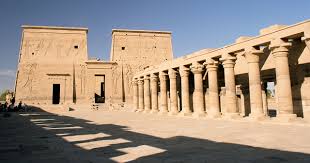This may come as a surprise to most people, but the psychological factors behind a belief in atheism are in fact exactly the same as those involved in belief in the monotheistic religions. Historically, also, atheism has actually arisen out of these monotheistic religions.
Psychology and History of Atheism
Before I explain why this is so, and why these two – psychology and history – are linked, I should add the disclaimer that religions that allow for reincarnation, such as paganism or the religions of ancient civilisations like Egypt or Greece, should not be lumped together with these monotheisms. These are higher religions (paradoxically, it would seem), more advanced than the monotheisms that came later.
First – a history lesson. (With slight gratitude to Nietzsche). Judaism is not the world’s first monotheistic philosophy, nor is it the first monotheistic religion. To say that pre-Judaist polytheistic religions did not have a notion of ‘the universal principle’ (i.e. the monotheistic god) is an error. To go further and say that these people did not philosophize about their religion is what I would call temporal racism. Initiates into mystery religions would discuss and meditate on such things as a matter of training and course.
So we start in Egypt

Eyptian religion had/has two symbols to represent the universal principle, namely ‘Aten’ and ‘Amun’. ‘Aten’ represents the VISIBLE manifestation of this principle (represented by the sun) and ‘Amun’ the INVISIBLE (Amun’s epithet was ‘the hidden one’). It is this conflict, both philosophical and political, that arose out of these two that ultimately led to the form that monotheism would henceforth take. Basically, Amun won, and so the universal principle, i.e. god, was thereafter seen as INVISIBLE.
Psychologically, the universal god of course represents so many things to human beings – to name a few – ‘the soul’; ‘that which human beings can become’ (the endpoint of evolution); ‘nature’; ‘aspirations’ (see tarot card 17 in major arcana – the star); ‘that which is immortal and beyond death’, and so on. Thus to posit such a thing as invisible is to create an unbridgeable gulf between man and the divine (cf. also Plato’s cave in The Republic).
So Now We Come to Judaeism
The Judaisest religion is a combination of the Egyptian Amun as universal principle together with the local mountain/volcano demon (note – not god but mere demon) Jahweh. Thus the wrathful omnipotent god. Because of this, the Jewish mentality looks AT, rather than FROM god. (No graven images either to help learn about the principle and what it means philosophically). The gulf between man and the divine begins.
Furthermore, and perhaps what is more important, death becomes the focal point around which all lifetime is ordered. And thus all ethical considerations. In order to survive death one has to do what one is told, perhaps, and further to this even death is seen as the destruction of one’s own identity (as with some Buddhist philosophy). Death becomes ‘the other’.
Christianity – Christ, being a philosopher who was also a student in Egypt, understood this psychology, and sought to provide a solution – ‘look from god, not at god’; ‘god is within’ ‘i am god – i’m the way – do as i do’. Unfortunately because christianity arose in a judaeist environment in which looking at, rather than from, was the rule, the followers of Jesus misunderstood him and looked AT him instead of FROM. How ironic (And do you think Jesus would want to look at a cross and be reminded of his ‘passion’?).
Anyway, to cut a long ramble short, as i’m sure you want me to, atheism is basically a reaction to this ‘gulf between man and the divine’. Or between ‘man and what he can become’. It is a fundamental, instinctive human reaction to something that is ‘not right for human beings’. Unfortunately, atheists have, in rejecting monotheism, also rejected ALL religions, ALL spirituality, ALL magick. this is their error.
As for the fear of death, obviously these monotheisms, by saying that you live one lifetime then it’s heaven or hell, effectively end any possibility of long-lasting self-improvement (and also improvement to one’s environment – hence the history of monotheistic and atheistic ‘nature is there to be used by us’) or responsibility. And yet it also provides a safety net to the fear of death (remember, by god being invisible death becomes something dark and unknowable – see the difference between this and the rich culture of Egypt in which death was all around and not to be feared). Atheism, on the other hand, sees death as the end; there is no afterlife. But is this not actually the same thing? One lifetime, and that’s it. Psychologically, from the ‘fear of death’, these courageous atheists have decided to be strong and say ‘i’m not scared’. thus they think they have achieved something. They think they, like Jesus, have discovered the flaw in these monotheisms. But essentially they are governed by the same psychological principle. Namely death as central.
That’s about it, I think. except to say two final things to go away with:
First, modern theoretical science is slowly waking up to the fact that despite its atheist outlook many of the things previously described as ‘magick’ are in fact EXPLAINABLE. (i.e. the interconnectedness of all things, or quantum connectivity beyond the speed of light as in the EPR experiment/paradox).
Secondly, it should be noticed that much of modern ethics or morality is based on this one-lifetime thing. take euthanasia, for example, or abortion (you’re not killing a soul, you’re allowing it another chance).
The question one really needs to ask now is this – is this outlook (monotheistic as well as atheist) good for the human species and its future, or is it detrimental? To borrow Nietzsche‘s phrase, ‘to what extent is it LIFE-AFFIRMING?’






